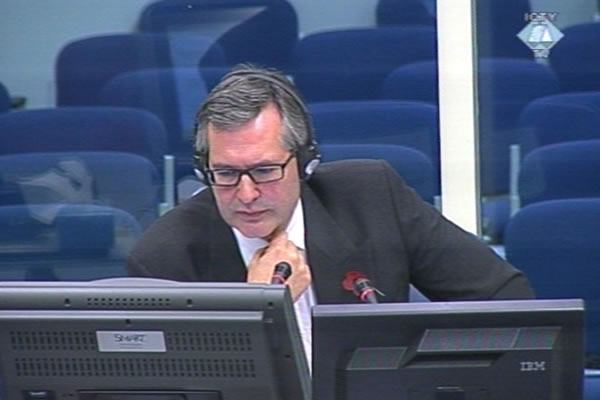Home
WHO CONTROLLED ARTILLERY AROUND SARAJEVO: MLADIC OR SDS?
In the cross-examination of the prosecution military expert Richard Phillips, Mladic’s defense tried to shift the blame for the shelling of Sarajevo on the Bosnian Serb politicians. The prosecution brought up to a document showing that the Main Staff controlled the Sarajevo-Romanija Corps and could even directly decide about the deployment of the artillery around the city
 Richard Philipps, witness at the Ratko Mladic trial
Richard Philipps, witness at the Ratko Mladic trial Ratko Mladic’s defense counsel began cross-examining British lieutenant colonel Richard Phillips today. In a bid to contest the witness’s expert findings that the VRS Sarajevo-Romanija Corps was a professional and well-organized formation, Mladic’s defense counsel tried to prove that the political authorities in Republika Srpska were responsible for the attacks on Sarajevo. According to previous Tribunal’s judgments, the Sarajevo-Romanija Corps was responsible for the shelling and sniper attacks on Sarajevo civilians. In the VRS chain of command, this unit was subordinated to the accused General Mladic.
Defense counsel Branko Lukic showed an official record of 4 August 1995, in which a security officer in the Sarajevo-Romanija Corps criticizes the corps commander for making personnel changes ‘based on the wishes of the Serbian Democratic Party and not according to the officers’ military skills’. The military expert warned it would be a ‘dangerous step’ to conclude that such things actually happened based on a single document. Also, the military expert noted it was ‘unusual, even shocking’ for a lower-ranking officer to criticized his superior in an official record. The witness did agree it would indeed be bad to appoint officers based on political decisions, if that indeed happened. The record also says that the ‘Sarajevo-Romanija Corps artillery is under immediate control of the party’. The witness replied that it was the only document making such an allegation.
The defense counsel then showed the witness the minutes from a meeting of the Sarajevo-Romanija Corps command and its subordinate units on 4 January 1995. At the meeting, the brigade commanders spoke about the problems they were encountering: soldiers who were not ‘properly trained’, lack of officer cadre leading to only 30 percent of command posts being filled in some units and the average age of soldiers in some cases being over 50. The witness agreed that soldiers were ‘relatively poorly trained’; this was a problem. However, the units underwent constant training to improve the situation. The witness also said that the officer staffing levels were at about 50 percent of the establishment levels. As regards the soldiers’ age the witness contends that every option has its advantages and drawbacks: older soldiers were ‘wiser’ while younger were physically fitter.
In this report, an officer complained about the ‘irregular reporting’ from the field. Phillips said that as he examined a large number of reports, he noted that their quality varied. However, any officer could confirm their authenticity by comparing the data he received with the situation in the field, Phillips argued.
In the re-examination, prosecutor Grace Harbour showed the witness an excerpt from these minutes in which the corps commander Dragomir Milosevic issues an oral directive to ‘improve the training and morale of soldiers, to increase combat readiness of units and to take measures to ensure the reporting proceeds according to proper procedure’. As the witness said, it was a good example of a commander doing something to improve the situation in the corps.
The prosecution contested the defense’s claim that the political structures controlled the artillery around Sarajevo. The prosecutor showed a document indicating that the VRS Main Staff ordered the transfer of artillery pieces from one unit to another within the Sarajevo-Romanija Corps. This order was issued by the chief of the Main Staff who followed Mladic’s instructions, the witness explained.
Richard Phillips completed his evidence today. The trial continued with the evidence of former prisoner in the Prijedor prison camps Nusret Sivac.
Linked Reports
- Case : Mladic
- 2012-11-07 STRICT LINE OF COMMAND WITH MLADIC ON TOP
- 2012-11-06 VRS INSIDER GIVES EVIDENCE
- 2012-11-05 ISMET SVRAKA TESTIFIES FOR THE SECOND TIME AT THE TRIBUNAL
- 2012-11-09 ‘BLOODY ADMISSION SYSTEM’ IN OMARSKA
- 2012-11-12 DEFENSE: TRAM HIT BY STRAY BULLET
- 2012-11-15 MLADIC ‘DOMINANT PERSONALITY’ IN THE VRS
